A collection as big as Texas: 6,000+ books about state added to San Marcos Public Library
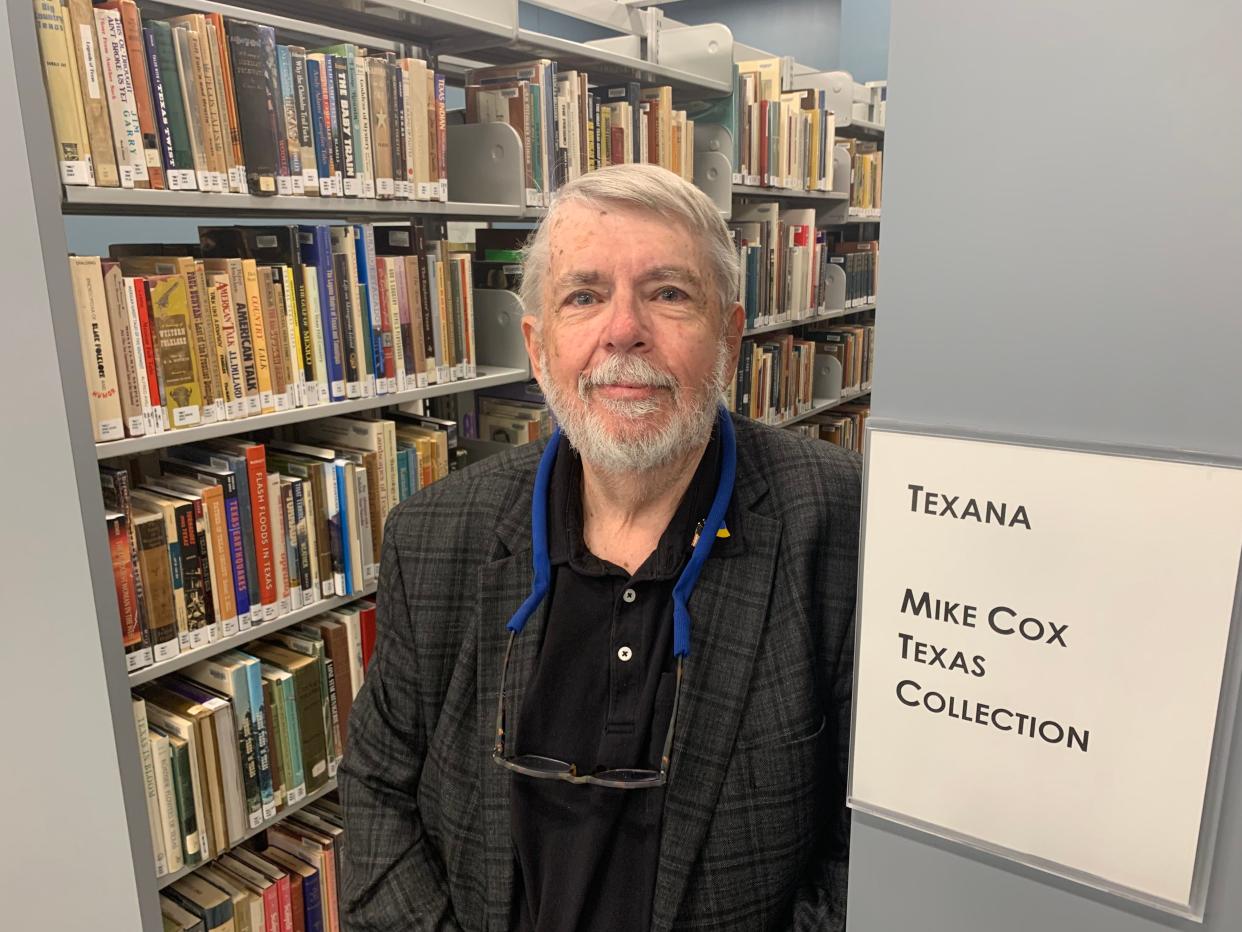
SAN MARCOS — Mike Cox acquired his first Texas book in 1954 while in the first grade.
It was the 1947 action history, "Old Fort Davis," by pulp fiction writer and lay historian Barry Scobee, namesake for Barry Scobee Mountain, located not far from Fort Davis.
His maternal grandfather, L.A. Wilke, an old-school Texas journalist and storyteller, purchased the book for the young Cox after a family visit to the fort, whose ruins are amazingly well-preserved by West Texas aridity at the foot of the Davis Mountains.
Cox kept the book. And many others.
More: An urban homestead called Flower Hill preserves a family's Austin-centric history
During a long career as a journalist, author, historian, bookseller and spokesman, Cox collected more than 6,000 volumes of Texana.
Completing an agreement worked out in 2017, Cox donated that collection — which on the open market might be worth hundreds of thousands of dollars — to the San Marcos Public Library.
The neatly jacketed books now have been catalogued and shelved in a special room at the newly expanded library. The public is welcome to read them, although, because many volumes are uncommon, scarce or rare, they are stored in "closed stacks." One should consult the library's online collection catalogue first, then make an appointment to read any particular books on site. They cannot be checked out.
From a reader to a writer
Cox, 73, comes from a long line of readers, writers and book lovers. His parents met in 1946 while covering a sensational murder trial in Sweetwater for competing newspapers. His mother, Betty Wilke Cox (1928-2006), was a librarian by profession, and his father, Bill G. Cox (1926-2000), a newspaperman; both also were freelance writers.
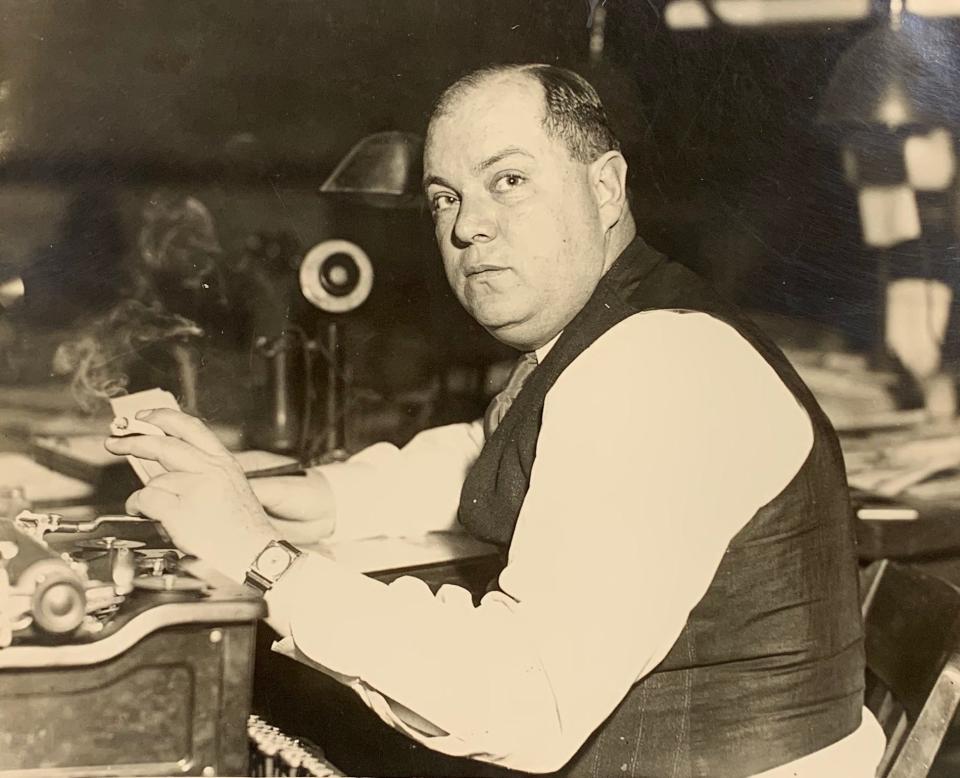
A native of Amarillo, born in 1948, Cox started his budding journalism career at the Austin American-Statesman during the 1960s while he was still in high school. He sold his first story to The Cattleman magazine in 1964.
While a student at Angelo State University, he worked for the San Angelo Standard-Times. After he transferred to Texas Tech University, he attended class during the day and worked nights at the Lubbock Avalanche-Journal.
Texas history, delivered to your inbox
Click to sign up for Think, Texas, a newsletter delivered every Tuesday
During the 1970s and early 1980s, Cox served as an all-purpose reporter back in Austin at the American-Statesman. After accepting a job as a spokesman for the Department of Public Safety and, later, for the Texas Press Association, he continued to contribute a Texas history column that was published in the Austin newspaper until 2013.
I sought out his column religiously.
Along the way, Cox, who was inducted into the Texas Institute of Letters in 1993, wrote more than 35 books, almost all of them devoted to Texas history. Cox writes in a clear, concise, unforced style that makes even familiar Texas lore a pleasure to read.
Cox estimates he has written more than 7 million words of nonfiction. His papers are now housed at the Wittliff Collections at Texas State University in San Marcos and at Baylor University in Waco.
Thanks to the efforts of Arro Smith, technical services manager for the San Marcos library, I learned of this treasure trove and was able to meet with Cox shortly before the dedication of the Mike Cox Texas Collection on April 23.
Memories of a book hunter
Chatting in the quiet room full of Texas stories, it came as no surprise to me that Cox had already begun writing about his life as a book collector. He shared an incomplete digital memoir, "Book Hunter: Collecting and Letting Go," which ends with the search for a "forever home" for his library.
"My life has been a lively page-turner with numerous chapters, some good, some bad, but there's always been one constant theme: books," Cox writes. "I have been a reader of books, a collector of books, a seller of books, a reviewer of books and a writer of books.
More: Explore the historically upside-down world of dance marathons in Depression-era Galveston
"Regrettably, my metaphorical book is down to its last chapters. I hope I still have several long chapters left to work my way through, but a book — or a life — cannot go on forever."
Among his early memories, Cox recalls one adult outside the family who fanned the flames of his interest in Texas history, Martine Holbrook, his seventh-grade homeroom teacher at Lanier Junior-Senior High School (now Juan Navarro High) in Austin.
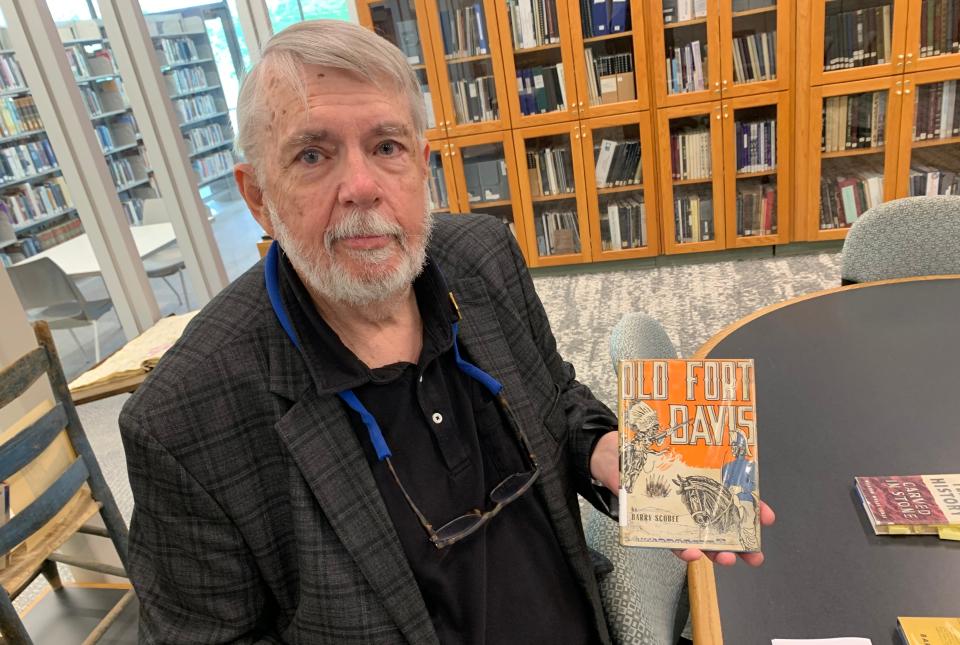
"Miss Holbrook had been a teacher for a good while, and she was good at it," Cox writes. "Beyond what we learned from her and our textbook, every pupil got a free copy of 'Texas History Movies.'"
Those comic books, provided by Mobil Oil Company, oversimplified Texas history, but drew Cox deeper into the subject.
Holbrook encouraged each student to keep a notebook on a particular aspect of Texas history. Remembering road trips with his grandfather, Cox chose old Texas forts.
"In compiling it, I laboriously copied a history of each fort from Granddad's two-volume 'Handbook of Texas,' clipped newspaper and magazine articles related to the subject, and collected anything else about old Texas forts that I could put in my notebook," he writes. "By the time we turned our notebooks in for grading, mine held everything from a Scotch-taped leaf my grandmother had picked up at Fort Bliss in El Paso to postcards from the Fort Clark dude ranch in Bracketville.
More: Three ways to get a Lone Star State history lesson, from 'Think, Texas' and beyond
"I'd gathered so much material I ended up with two notebooks, the only two-volume set anyone put together."
A writer — or at least a researcher at this point — was born.
From old Texas forts, Cox moved on to collecting material on the Alamo, treasure hunting and historical markers. He divided his growing library thematically into sections such as "Texas ranching," "Texas outlaws and lawmen," "Texas folklore" "Texas humor" and "Texas letters."
"In putting together my Texas collection, I acquired books in about every way possible short of armed robbery," Cox says with a laugh. "The first books in my library came as gifts, either bestowed on me by a family member or friend, just because, or for Christmas or my birthday. Others were books I managed to convince my grandparents or parents to buy for me.
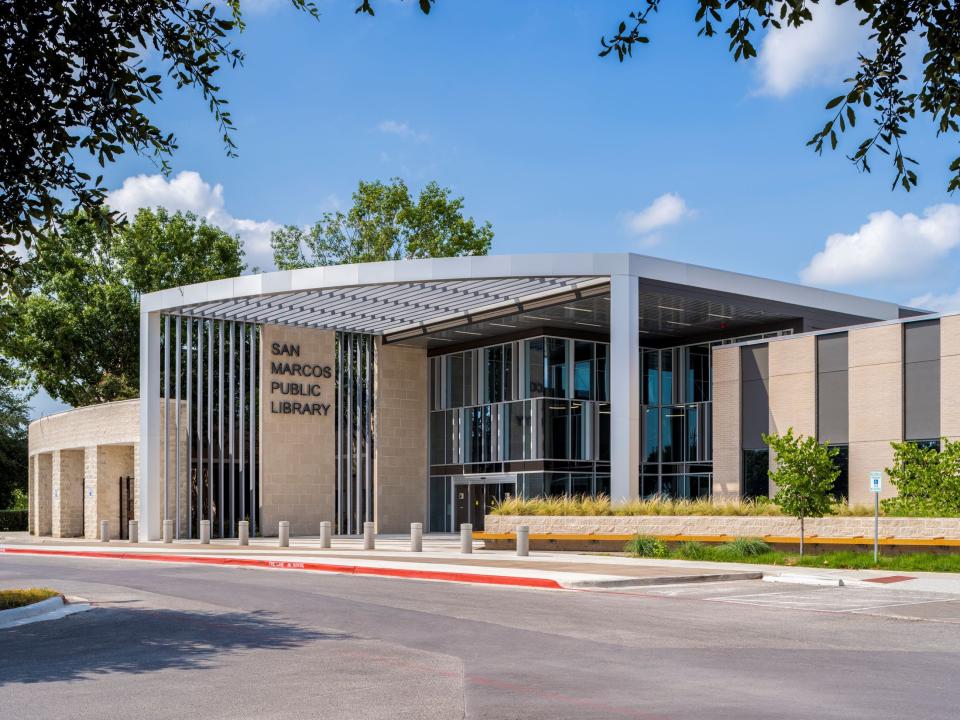
"Then, beginning when I was in junior high school and had a little allowance money to throw around, I started buying books on my own, from locally owned department stores, chain stores, independent bookstores and college bookstores. Fortunately, in the 1960s, most hardbacks were less than $5. Of course, back then a $5 bill had the buying power of $45 in today’s dollars.
"Considering how much they appreciated, my only regret is not buying more Texana."
Later, during his career in journalism, Cox acquired some of his books by reviewing them for various newspapers, including the American-Statesman, where his "Texana" column ran from 1982 to 2013.
In these memoirs, Cox includes a section of advice on book collecting. He also shares tales about becoming a more serious collector and discovering that buying and selling books could give him at least enough cash to buy more books. He set up pop-up stands at book and paper shows on the weekends and owned a share of the Austin Book and Paper Show.
With a veteran bookseller, Tom Munnerlyn, he opened a store, State House Books — beloved by collectors — at 1604 S. Congress Ave., just two doors down from a current thriving used bookstore, South Congress Books.
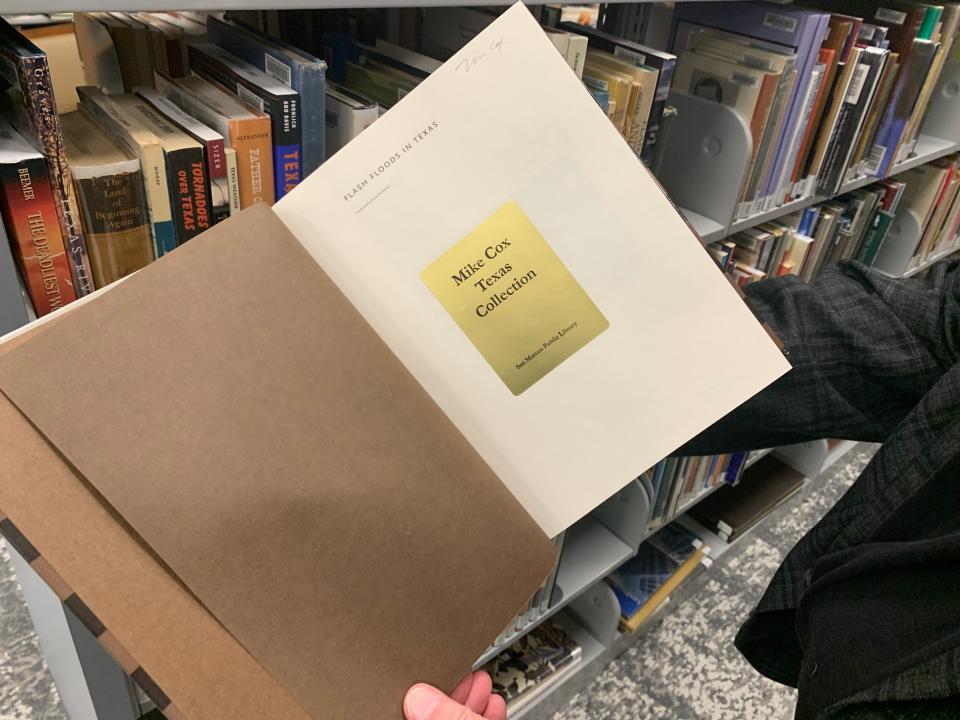
The crowds and the cash, however, never seemed to materialize at State House. Eventually, he sold out to Munnerlyn.
Cox ends the memoir with a chapter on letting go of his library.
"On paper, my Texana was worth several hundred thousand dollars," Cox writes. "But despite that, my library was beginning to be as much a source of trouble as pleasure. It had become increasingly more challenging to make space for my collection, which at its high point filled two large rooms of my house with almost every inch of wall space taken up by shelves.
"To maximize what my shelves could accommodate, I’d stacked my books horizontally, a trick I learned from the late bibliophile Lon Tinkle. Eventually, I had to come up with a Plan B."
More: History is a click away: The best digital tools for Texas history buffs
Various public libraries in Fort Worth, Brenham, Dripping Springs and Wimberley expressed interest in acquiring the Mike Cox Texas Collection. They all lacked either money or space or both.
Cox signed a letter of agreement with the San Marcos Public Library in early 2017, four years before its new enlargement was completed. Now came the boxing, unboxing and cataloging. It was a long four years.
"At least I know that my books will live on as I assembled them," Cox writes. "I can be further pleased that they will be of benefit to future researchers, from genealogists and students to writers and historians. I know I’ve done the right thing, but I’ll say again that it’s one of the most difficult things I’ve ever faced.
"To end on a glass-half-full note, I don’t intend to ever stop collecting books. For as long as I can still walk and think I’ll be hunting for scarce, uncommon or bibliographically unknown Texana, from old newspapers to pamphlets to hard and softcover books.
"The only difference is that I’ll be adding any additional Texas-related items I come across — well, I might keep a few titles for a while — to my collection in San Marcos."
Michael Barnes writes about the people, places, culture and history of Austin and Texas. He can be reached at mbarnes@statesman.com.
Mike Cox Texas Collection
Where: San Marcos Public Library, 625 E. Hopkins St., San Marcos
How much: Free, by appointment only, consult the library's online catalogue for the collection first
Information: 512-393-8200; sanmarcostx.gov/586/Library
This article originally appeared on Austin American-Statesman: 6K-volume Mike Cox Texas Collection opens at San Marcos Public Library

